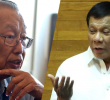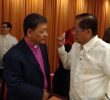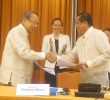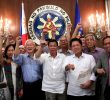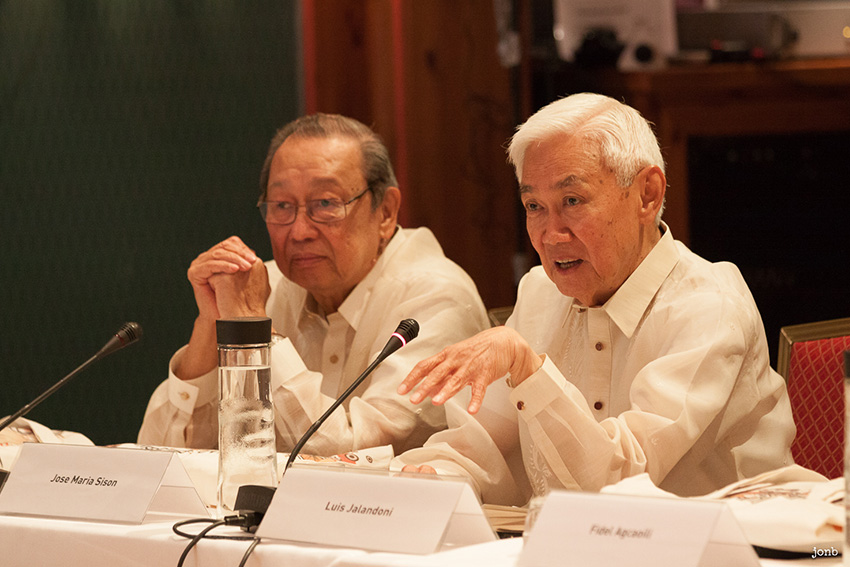
Luis Jalandoni, senior adviser of the National Democratic Front peace panel says the NDFP is firm in its position that the release of the political prisoners is an obligation of the government under the previously signed agreements. (photo by Kodao Productions)
DAVAO CITY, Philippines (Updated as of 12:25, December 14, 2016)– Is the National Democratic Front of the Philippines ready to sign a bilateral peace agreement even without the release of political prisoners?
NDF peace panel senior adviser Luis Jalandoni in a statement Monday clarified that is is not abandoning its “principled stand” on the release of the political prisoners as it calls the attention of the government panel to avoid misrepresenting their statement.
On Monday, GRP chief negotiator Silvestre Bello III said they welcome the statement of NDF senior adviser Luis Jalandoni on “the readiness of the NDF to sign a bilateral ceasefire agreement with the government even before the release of the political prisoners.”
Bello said: “The willingness of the NDF to sign the bilateral ceasefire agreement is indeed a welcome development as this bodes well to a positive atmosphere when we meet again for the third round of talks in January.”
“A bilateral ceasefire would not only benefit the combatants, but the people who are caught in the crossfire of this armed conflict,” he added.
But the Jalandoni said the GRP “conspicuously omitted the NDFP’s position that any such agreement should take effect 48 hours after the signing, in keeping with the time frame within which President Rodrigo Duterte said he would order the release of all political prisoners.”
He said they are firm in their position that the release of political prisoners is “first and foremost an obligation of the GRP under signed agreements, particularly the CARHRIHL and the JASIG, which the GRP has reaffirmed.”
Jalandoni said the release of political prisoners “cannot be reduced to a simple act of goodwill which the government can opt to take or not.”
“Interim ceasefires on the other hand, whether unilateral or bilateral, are among the options that can be taken to build mutual trust and confidence. But they can also contribute to the erosion of goodwill when they are routinely violated, as what has happened to the GRP’s unilateral ceasefire in the last four months,” he said.
‘More disastrous’
Jalandoni also said the unilateral ceasefire has given the government troops an opportunity to “encroach on revolutionary territory and violate the people’s rights with impunity.”
“A bilateral ceasefire agreement could therefore prove more disastrous to the people if entered into precipitately by the NDFP and divorced from the larger context of the GRP’s continuing non-compliance with signed agreements.”
He said they continued to receive reports regarding the continued “combat and intelligence operations” of the Armed Forces of the Philippines and the Philippine National Police.
“The statistics this December are grim: 18 activists killed extrajudicially, with 20 others surviving attempts on their lives; more than 13,000 civilians victimized by forced evacuation; more than 14,000 cases of schools, clinics, chapels and other civilian infrastructure used as barracks by the AFP, all in violation of the CARHRIHL,” Jalandoni said citing the Comprehensive Agreement on the Respect on Human Rights and International Humanitarian Law, the first substantive agenda signed between the government and the NDF.
Judicial process
The government panel said the release of political prisoners is taking time because it must undergo judicial process.
But the GRP maintained that they are committed on the release of the prisoners.
GRP panel member Atty. Angela Librado-Trinidad said they have already amended the guidelines of the Presidential Committee on Bail, Recognizance, and Pardon (PCBReP), which will be the platform on the release of detainees based on humanitarian grounds.
“We already drafted the amnesty proclamation and submitted it to the president last September,” Librado-Trinidad explained.
She said the new rules of the PCBReP will now cover the commission of the crime that took place on or before July 1 this year; while, the amnesty proclamation is already being reviewed by the Office of the President.
Librado-Trinidad said they are now collating all the information on the prisoners who will be released before the third round of the GRP-NDF peace talks in January next year.
Last December 2, President Rodrigo Duterte granted presidential pardon to four political prisoners whose recommendations for pardon, according to the GRP, were not acted upon by the previous administration.(davaotoday.com )

